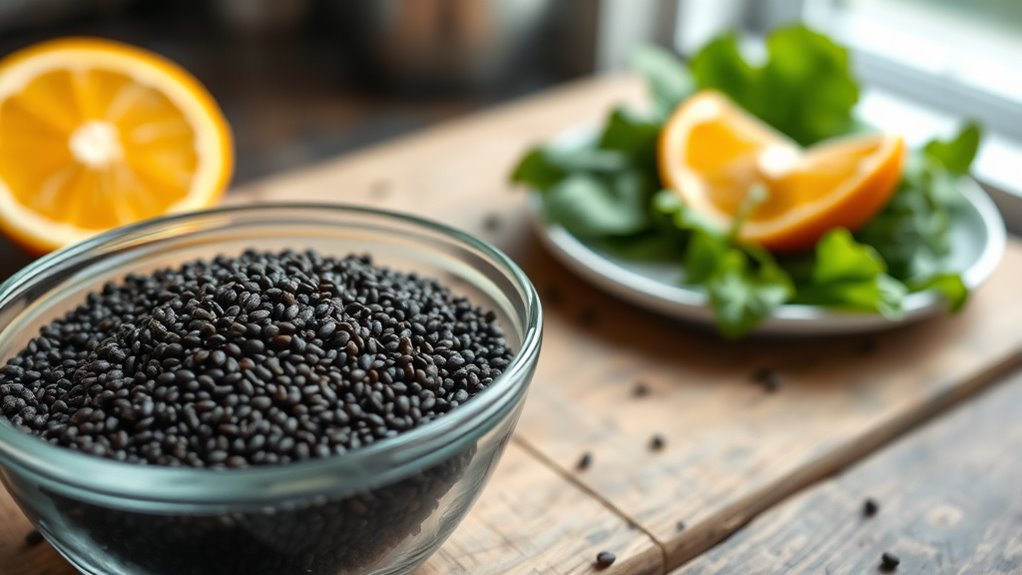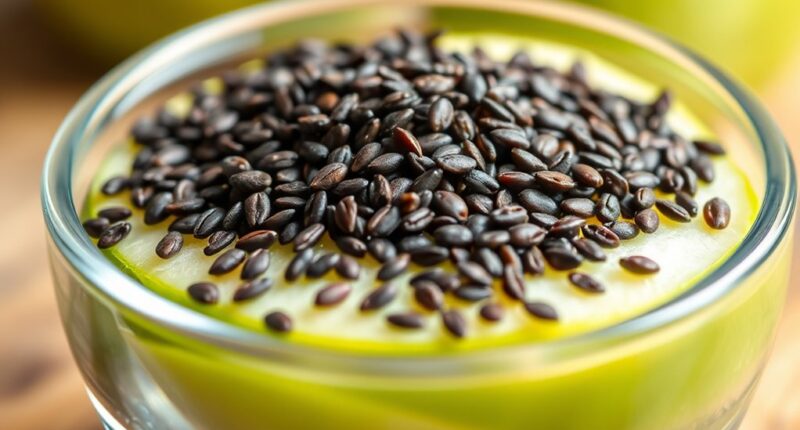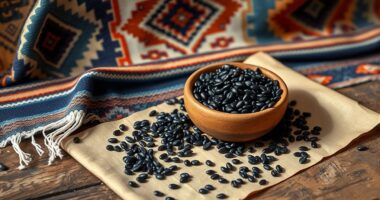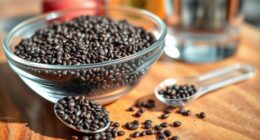Chia seeds are a smart addition to your diet if you have diabetes because their high fiber content helps slow digestion and makes blood sugar levels more stable. The soluble fiber forms a gel-like substance that aids glucose absorption, supporting better insulin sensitivity. They also provide healthy fats and nutrients that promote fullness and overall metabolic health. If you want to understand how these nutrients can benefit you further, keep exploring the research behind chia seeds and blood sugar management.
Key Takeaways
- Chia seeds are high in soluble fiber, which helps slow digestion and stabilize blood sugar levels after meals.
- Research indicates that chia seed consumption may improve insulin sensitivity and glucose utilization in people with or at risk of diabetes.
- The fiber in chia seeds forms a gel-like substance that moderates glucose absorption, supporting blood sugar management.
- Chia seeds offer additional benefits like promoting satiety, aiding weight control, and providing omega-3s and antioxidants.
- They should complement, not replace, diabetes treatment, and consulting healthcare providers is recommended before significant dietary changes.

Have you ever wondered how chia seeds might support managing diabetes? These tiny powerhouses are packed with nutrients, and many people with diabetes are curious if they can help regulate blood sugar levels. One of the key reasons chia seeds are often recommended is because of their impressive fiber benefits. Fiber plays a pivotal role in controlling blood sugar by slowing down the digestion process, which helps prevent sudden spikes after meals. When you include chia seeds in your diet, their soluble fiber forms a gel-like substance in your stomach, which can moderate how quickly glucose enters your bloodstream. This means your blood sugar levels stay more stable, reducing the risk of dangerous highs and lows.
Research indicates that the fiber content in chia seeds can indeed help improve blood sugar management. Several studies suggest that consuming high-fiber foods like chia seeds may enhance insulin sensitivity, allowing your body to utilize glucose more effectively. This is particularly beneficial for people with type 2 diabetes, who often experience insulin resistance. The fiber benefits of chia seeds extend beyond blood sugar control; they also promote feelings of fullness, which can help with weight management—a crucial aspect of managing diabetes. When you feel satisfied after meals, you’re less likely to overeat or snack on high-carbohydrate foods that can cause blood sugar fluctuations.
High-fiber chia seeds may boost insulin sensitivity and aid weight management in diabetes.
Additionally, chia seeds are rich in omega-3 fatty acids, antioxidants, and some essential minerals, all of which contribute to overall metabolic health. Incorporating these seeds into your diet is simple—they can be added to smoothies, yogurt, oatmeal, or baked goods. Because they absorb liquid and swell, just a small amount can create a substantial feeling of fullness, helping you stick to a balanced diet. This satiety effect, combined with their fiber benefits, makes chia seeds a valuable addition to your diabetes management plan. Furthermore, understanding the importance of sound design principles such as clarity and balance can be metaphorically related to maintaining a balanced diet for optimal health.
However, it’s important to remember that while chia seeds can support blood sugar regulation, they shouldn’t replace your prescribed medications or a thorough diabetes care plan. They are a supplement, not a cure. As with any dietary change, it’s wise to consult your healthcare provider, especially if you’re taking medications that influence blood sugar levels. Overall, adding chia seeds to your diet can be a smart move, thanks to their fiber benefits that support blood sugar stability and overall health. Just be mindful of portion sizes and incorporate them thoughtfully to maximize their benefits.
Frequently Asked Questions
Can Chia Seeds Replace Diabetes Medication?
You can’t replace diabetes medication with chia seeds, even if you enjoy chia seed packaging or haven’t experienced chia seed allergies. While chia seeds can help regulate blood sugar and support your diet, they aren’t a substitute for prescribed treatments. Always talk to your healthcare provider before making changes, and remember that chia seed allergies can cause reactions, so monitor your response carefully.
Do Chia Seeds Affect Insulin Sensitivity?
They say, “You are what you eat,” and chia seeds can help you manage blood sugar and insulin response. Research shows they may improve insulin sensitivity, helping your body use glucose more effectively. By adding chia seeds to your diet, you could support better blood sugar control. Remember, they’re a supplement, not a replacement for medical advice, so always consult your healthcare provider for personalized recommendations.
Are There Any Risks of Consuming Chia Seeds Daily?
You might wonder if daily chia seed intake has risks. While they offer fiber benefits that support digestion and blood sugar control, be mindful of allergy concerns, especially if you’re allergic to sesame or other seeds. Consuming too many can cause digestive issues like bloating or constipation. Moderation is key, and start with small amounts to see how your body reacts. If unsure, consult your healthcare provider.
How Much Chia Seeds Should Diabetics Eat?
You should aim for about 1 to 2 tablespoons of chia seed nutrition daily, as this amount supports blood sugar control. Chia seeds are rich in fiber, omega-3s, and antioxidants, which help stabilize your blood sugar levels. Start with a small portion, like one tablespoon, and gradually increase to avoid digestive discomfort. Incorporating chia seeds into your diet can be a simple way to boost overall health and manage diabetes effectively.
Do Chia Seeds Influence Blood Sugar Fluctuations?
You might notice that chia seeds help stabilize blood sugar fluctuations due to their high fiber content. When you include them in your diet, the fiber slows down sugar absorption, preventing sharp spikes in blood sugar levels. This can lead to more steady energy and better overall control. So, adding chia seeds can be a smart way to support your blood sugar management and reduce fluctuations throughout the day.
Conclusion
So, are chia seeds the secret weapon for managing diabetes? The research hints at promising benefits, but the full story is still unfolding. Will they become a staple in your diet, or are there hidden risks yet to be uncovered? Keep watching this space, because as science advances, you’ll want to stay ahead of the game. The truth about chia seeds and diabetes might surprise you—stay tuned for more updates.









